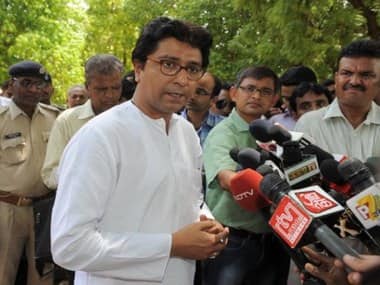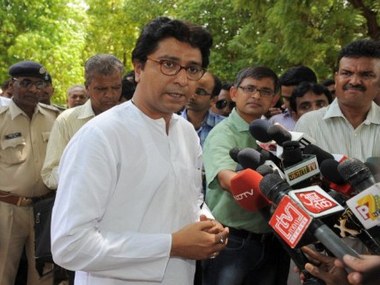Two days before the Maharashtra Navnirman Sena’s annual foundation day celebrations, speculation is rife on whether Raj Thackeray will oblige the Bharatiya Janata Party and decline to field candidates for the Lok Sabha election this April. Following a quiet meeting between Thackeray and former president of the Bharatiya Janata Party Nitin Gadkari at a Mumbai hotel earlier this week, all eyes are on whether it appears that the Maharashtra Navnirman Sena is willing to play ball with the BJP. [caption id=“attachment_1389019” align=“alignleft” width=“380”]
 Raj Thackeray. AFP image[/caption] The request extended to Raj is obvious: Allow the Marathi vote to remain unified – this will help the NDA in Maharashtra and will help Narendra Modi’s Mission 272 at the Centre. Expectedly, Shiv Sena president Uddhav Thackeray has not taken well to Gadkari’s quiet overtures to his estranged cousin Raj Thackeray. A BJP-MNS alliance has been the subject of rumour mills for over a year now, not in the least because the Sena and the BJP have had a series of rather public disagreements. After the Gadkari-Raj meeting, rumours abound of a deal between the two, and there is plenty of conjecture on what exactly such a deal could comprise – perhaps it is an understanding for friendly fights in the Assembly elections later this year that will be much more significant for the MNS, or perhaps an understanding for a limited one or two Lok Sabha seats for the MNS provided it does not field candidates elsewhere in its strongholds. For the NDA, the logic of such an understanding with the MNS would be sound. In the 2009 Lok Sabha election, in constituency after constituency where the MNS fielded its strongest candidates (and this was especially visible in Mumbai’s six LS constituencies that were all eventually grabbed by Congress-NCP candidates), the MNS candidate sliced the Marathi vote into neat halves. The winning margin for Mumbai’s MPs nearly matched the votes won by the MNS candidates. At least one MNS candidate finished second, leaving a sitting Sena MP at third position – that was the extent of the MNS’s strength in the 2009 election. The MNS not contesting would mean almost certain defeat for Mumbai’s five Congress MPs and one NCP MP. Further, it’s already widely accepted that the somewhat depleted Shiv Sena, especially after the demise of Bal Thackeray, does not attract the Maharashtrian vote as it used to. A large percentage of the Sena’s traditional support base has switched allegiance to the MNS and its more charismatic leader, a process that will pick up further speed if the Sena performs below par in the Lok Sabha polls. In such a scenario, the possibility of the BJP jettisoning the Shiv Sena altogether and opting for the MNS as a partner in Maharashtra is very high. The MNS, for its part, will be gunning for that anyway – its primary aim is to consolidate the Marathi-speaking votes, first in its strongholds of Mumbai, Thane and Nashik, and then later in the rest of Maharashtra over the next five to 10 years. The MNS presently appears disinclined to contest the LS polls, speculated
this report in The Economic Times
. Whether that is indeed so one can expect to find out on Sunday when Raj addresses his supporters. His voters can hardly be pleased to think he’s not in the game to win, but it’s undeniable that his most popular legislators in the state Assembly are not keen to move to Delhi to play bit roles in a hung Parliament. Not when the possibility of a Congress-NCP rout in the Assembly elections this October or five years later is possible. An alliance with the BJP could be a long-term strategy, not for a role in the NDA, but for a big role in Maharashtra. The MNS made a starry debut in the 2009 Assembly election, winning 13 seats. Hunkering down and planning for setting up a state government in 2019 certainly seems like a more challenging goal than winning two Lok Sabha seats and continuing to play spoiler for Shiv Sena candidates.
Raj Thackeray. AFP image[/caption] The request extended to Raj is obvious: Allow the Marathi vote to remain unified – this will help the NDA in Maharashtra and will help Narendra Modi’s Mission 272 at the Centre. Expectedly, Shiv Sena president Uddhav Thackeray has not taken well to Gadkari’s quiet overtures to his estranged cousin Raj Thackeray. A BJP-MNS alliance has been the subject of rumour mills for over a year now, not in the least because the Sena and the BJP have had a series of rather public disagreements. After the Gadkari-Raj meeting, rumours abound of a deal between the two, and there is plenty of conjecture on what exactly such a deal could comprise – perhaps it is an understanding for friendly fights in the Assembly elections later this year that will be much more significant for the MNS, or perhaps an understanding for a limited one or two Lok Sabha seats for the MNS provided it does not field candidates elsewhere in its strongholds. For the NDA, the logic of such an understanding with the MNS would be sound. In the 2009 Lok Sabha election, in constituency after constituency where the MNS fielded its strongest candidates (and this was especially visible in Mumbai’s six LS constituencies that were all eventually grabbed by Congress-NCP candidates), the MNS candidate sliced the Marathi vote into neat halves. The winning margin for Mumbai’s MPs nearly matched the votes won by the MNS candidates. At least one MNS candidate finished second, leaving a sitting Sena MP at third position – that was the extent of the MNS’s strength in the 2009 election. The MNS not contesting would mean almost certain defeat for Mumbai’s five Congress MPs and one NCP MP. Further, it’s already widely accepted that the somewhat depleted Shiv Sena, especially after the demise of Bal Thackeray, does not attract the Maharashtrian vote as it used to. A large percentage of the Sena’s traditional support base has switched allegiance to the MNS and its more charismatic leader, a process that will pick up further speed if the Sena performs below par in the Lok Sabha polls. In such a scenario, the possibility of the BJP jettisoning the Shiv Sena altogether and opting for the MNS as a partner in Maharashtra is very high. The MNS, for its part, will be gunning for that anyway – its primary aim is to consolidate the Marathi-speaking votes, first in its strongholds of Mumbai, Thane and Nashik, and then later in the rest of Maharashtra over the next five to 10 years. The MNS presently appears disinclined to contest the LS polls, speculated
this report in The Economic Times
. Whether that is indeed so one can expect to find out on Sunday when Raj addresses his supporters. His voters can hardly be pleased to think he’s not in the game to win, but it’s undeniable that his most popular legislators in the state Assembly are not keen to move to Delhi to play bit roles in a hung Parliament. Not when the possibility of a Congress-NCP rout in the Assembly elections this October or five years later is possible. An alliance with the BJP could be a long-term strategy, not for a role in the NDA, but for a big role in Maharashtra. The MNS made a starry debut in the 2009 Assembly election, winning 13 seats. Hunkering down and planning for setting up a state government in 2019 certainly seems like a more challenging goal than winning two Lok Sabha seats and continuing to play spoiler for Shiv Sena candidates.
The Marathi vote in Mumbai: Decoding the Raj Thackeray-Gadkari meeting
FP Politics
• March 6, 2014, 16:28:22 IST
In Mumbai, the MNS not contesting would mean almost certain defeat for Mumbai’s five Congress MPs and one NCP MP.
Advertisement
)
End of Article